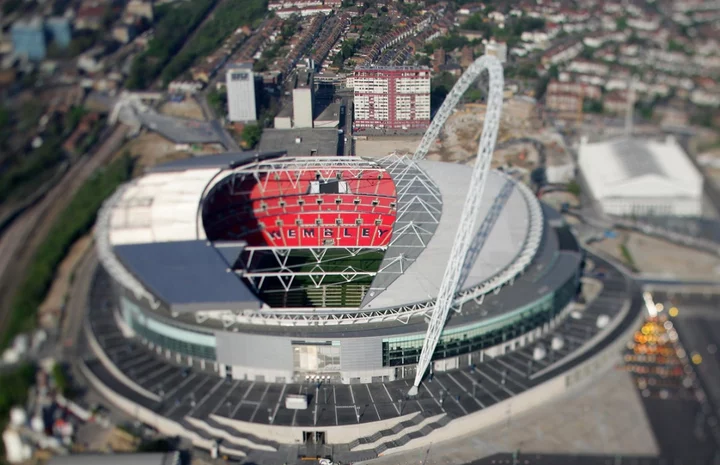Cardiff, Glasgow, Dublin... The Euro 2028 final should be staged anywhere but Wembley
You already know where the Euro 2028 final will be played. You don’t know know because it hasn’t been announced yet. But when I tell you that the UK and Ireland are hosting the tournament, and when I show you the list of 10 allocated venues, then you already know. Wembley is the biggest stadium in the best-connected city of the largest host nation. It is the greatest revenue generator. It is the sort of stadium that assumes it will host a final, the sort that thinks other venues wouldn’t want all that pressure and attention anyway. The English FA will pull rank here and that is understandable, to an extent. After all, Wembley can call upon history and experience, the site having hosted three European Championship finals before: one at the old Wembley in 1996, and both the men’s and women’s finals at the new Wembley in 2021 and 2022. But the last men’s final – and this is a crucial detail – ended in literal invasion. The report on what happened that July day is harrowing, describing a horde of 6,000 mindless thugs rampaging through security lines and terrifying ordinary ticket holders. On their way they beat police officers, knocked over a young girl and trampled over a man sending him into seizure. One insurgent hijacked a boy in a wheelchair, separating him from his father, so he could gain access pretending to be a steward. Italians were subjected to random attacks, and the report makes clear that there probably would have been deaths had it not been for England’s defeat and a late downpour of rain which combined to dampen the atmosphere. It should be said here that the report did not lay blame at Wembley’s steps, specifically; rather it was a perfect storm of lockdown energy, summer heat, sporting tribalism, nationalist sentiment, drugs, alcohol, the internet and a unique gathering of goons gripped by herd mentality. But if ever there was a red flag for hosting a European Championship final, hosting a disastrous European Championship final might be it. It feels like an almost dangerously radical thought, but what if the Euro 2028 final wasn’t held at Wembley Stadium? Wembley hardly showcases the best of these isles. The immediate area has the personality of an airport terminal, and while the stadium was once a state-of-the-art bowl, it is not even the best in London these days given what Tottenham have built. Admittedly, the options are limited. Anfield’s pitch is too small for Uefa’s liking, Old Trafford too decrepit to be used. Everton’s unbuilt stadium made the final list along with Birmingham’s Villa Park, Manchester’s Etihad Stadium and St James’ Park in Newcastle, and the Etihad would be the most obvious of those to host a showpiece event. Then there are the four stadiums beyond England. The redevelopment of Belfast’s Casement Park is still just a saved file on an architect’s hard drive, and it would only be around 34,000 capacity. But the others are viable alternatives to host a final. Hampden Park is a tired venue but there are plans for much-needed regeneration ahead of Euro 2028. Glasgow is a city that gets its edge and its energy from football, and it knows how to throw a party. As does Dublin, and its Aviva Stadium has hosted everything from the Europa League final and international rugby games to Taylor Swift concerts. Personally, I would choose the Principality Stadium in Cardiff. Wales enjoyed a rekindled love affair with football during the Bale era, ignited by their run to the semi-finals of Euro 2016. Football has overtaken rugby as the country’s most popular sport and the Wrexham story is adding momentum. It is the next biggest option after Wembley with 74,000 seats, and the stadium sits near the heart of the city only a short walk from Chippy Lane, one of the great cultural institutions of this country. Tournament mission statements are always lukewarm sentiments and Euro 2028 is no exception, but if organisers really want to “engage new fans”, then staging the final in Wales would fit that brief. All this is likely wasted breath. The early signs are that Cardiff may stage the opening game but Wembley will host the final and both semi-finals, too. The English FA says it has learnt lessons from the past, and Uefa recently dismissed concerns when its president Aleksander Ceferin said that those violent scenes “could have happened anywhere”. Uefa lost £700m in revenues during the pandemic and needs a sure thing like Euro 2028 to guarantee a profitable tournament. Wembley is a significant part of that appeal. It is the biggest stadium, in the biggest city. But it is also the scene of unbridled anarchy only two years ago, and perhaps that is as good an excuse as any to spread the wealth. Read More FA reveal tournament plans after UK and Ireland confirmed as Euro 2028 hosts Euro 2028 venues: UK and Ireland name 10 stadiums as Anfield and Old Trafford miss out Euro 2028: Will host nations get automatic qualification? UK and Ireland name 10 venues for Euro 2028 FA reveal tournment plans after UK and Ireland confirmed as Euro 2028 hosts
You already know where the Euro 2028 final will be played. You don’t know know because it hasn’t been announced yet. But when I tell you that the UK and Ireland are hosting the tournament, and when I show you the list of 10 allocated venues, then you already know.
Wembley is the biggest stadium in the best-connected city of the largest host nation. It is the greatest revenue generator. It is the sort of stadium that assumes it will host a final, the sort that thinks other venues wouldn’t want all that pressure and attention anyway.
The English FA will pull rank here and that is understandable, to an extent. After all, Wembley can call upon history and experience, the site having hosted three European Championship finals before: one at the old Wembley in 1996, and both the men’s and women’s finals at the new Wembley in 2021 and 2022.
But the last men’s final – and this is a crucial detail – ended in literal invasion. The report on what happened that July day is harrowing, describing a horde of 6,000 mindless thugs rampaging through security lines and terrifying ordinary ticket holders. On their way they beat police officers, knocked over a young girl and trampled over a man sending him into seizure. One insurgent hijacked a boy in a wheelchair, separating him from his father, so he could gain access pretending to be a steward. Italians were subjected to random attacks, and the report makes clear that there probably would have been deaths had it not been for England’s defeat and a late downpour of rain which combined to dampen the atmosphere.
It should be said here that the report did not lay blame at Wembley’s steps, specifically; rather it was a perfect storm of lockdown energy, summer heat, sporting tribalism, nationalist sentiment, drugs, alcohol, the internet and a unique gathering of goons gripped by herd mentality. But if ever there was a red flag for hosting a European Championship final, hosting a disastrous European Championship final might be it. It feels like an almost dangerously radical thought, but what if the Euro 2028 final wasn’t held at Wembley Stadium?
Wembley hardly showcases the best of these isles. The immediate area has the personality of an airport terminal, and while the stadium was once a state-of-the-art bowl, it is not even the best in London these days given what Tottenham have built.
Admittedly, the options are limited. Anfield’s pitch is too small for Uefa’s liking, Old Trafford too decrepit to be used. Everton’s unbuilt stadium made the final list along with Birmingham’s Villa Park, Manchester’s Etihad Stadium and St James’ Park in Newcastle, and the Etihad would be the most obvious of those to host a showpiece event.
Then there are the four stadiums beyond England. The redevelopment of Belfast’s Casement Park is still just a saved file on an architect’s hard drive, and it would only be around 34,000 capacity. But the others are viable alternatives to host a final.
Hampden Park is a tired venue but there are plans for much-needed regeneration ahead of Euro 2028. Glasgow is a city that gets its edge and its energy from football, and it knows how to throw a party. As does Dublin, and its Aviva Stadium has hosted everything from the Europa League final and international rugby games to Taylor Swift concerts.
Personally, I would choose the Principality Stadium in Cardiff. Wales enjoyed a rekindled love affair with football during the Bale era, ignited by their run to the semi-finals of Euro 2016. Football has overtaken rugby as the country’s most popular sport and the Wrexham story is adding momentum. It is the next biggest option after Wembley with 74,000 seats, and the stadium sits near the heart of the city only a short walk from Chippy Lane, one of the great cultural institutions of this country.
Tournament mission statements are always lukewarm sentiments and Euro 2028 is no exception, but if organisers really want to “engage new fans”, then staging the final in Wales would fit that brief.
All this is likely wasted breath. The early signs are that Cardiff may stage the opening game but Wembley will host the final and both semi-finals, too. The English FA says it has learnt lessons from the past, and Uefa recently dismissed concerns when its president Aleksander Ceferin said that those violent scenes “could have happened anywhere”. Uefa lost £700m in revenues during the pandemic and needs a sure thing like Euro 2028 to guarantee a profitable tournament. Wembley is a significant part of that appeal.
It is the biggest stadium, in the biggest city. But it is also the scene of unbridled anarchy only two years ago, and perhaps that is as good an excuse as any to spread the wealth.
Read More
FA reveal tournament plans after UK and Ireland confirmed as Euro 2028 hosts
Euro 2028 venues: UK and Ireland name 10 stadiums as Anfield and Old Trafford miss out
Euro 2028: Will host nations get automatic qualification?
UK and Ireland name 10 venues for Euro 2028
FA reveal tournment plans after UK and Ireland confirmed as Euro 2028 hosts









